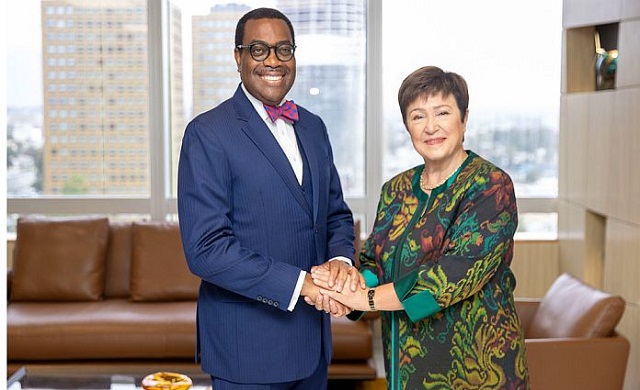
Africa is grappling with mounting debt crisis, with total external debt surpassing the US$1 trillion-mark last year
Kampala, Uganda | RONALD MUSOKE | Kristalina Georgieva, the Managing Director of the International Monetary Fund (IMF), has publicly endorsed the recent call by the African Development Bank Group, urging African governments to refrain from securing loans backed by natural resources.
The endorsement came following a meeting with Dr. Adesina Akinwumi, the President of the African Development Bank Group on Oct. 05.
Georgieva affirmed that the IMF’s senior management team would conduct a thorough assessment and issue a strong advisory against what she referred to as “predatory and enslaving loans.”
She said the matter will also be deliberated at the Global Sovereign Debt Roundtable, a forum comprising bilateral creditors, private creditors, and borrowing countries, co-chaired by the IMF, the World Bank, and the G20 presidency.
The rendezvous, held at the AfDB headquarters in Abidjan, Cote D’Ivoire, marked a historic occasion as it was the first time in the bank’s history that the head of the IMF visited its headquarters since its establishment in 1964.
Georgieva’s visit coincided with her en route to the World Bank Group and IMF Annual meetings in Marrakech, Morocco, a significant event last held in Africa 50 years ago.
She expressed her optimism about Africa’s potential for dynamic growth, emphasizing the need to focus on opportunities on the continent. She also highlighted the severe impact of climate change, financial instability, and debt amplification as challenges faced by the continent but underscored the importance of capital flowing to where it is needed most.
Surging debts
This development comes as Africa is grappling with mounting debt crisis. Africa’s total external debt surpassed the US$1 trillion-mark last year and is now expected to rise to US$1.3 trillion by the end of this year, according to the African Development Bank (AfDB).
The Russian-Ukraine war and the escalating costs of adapting to climate change have contributed to this surge, placing 25 African countries at the risk of high debt distress. The IMF recently sounded an alarm, noting that up to 22 African countries are either in debt distress or at risk of debt distress, nearly doubling the number from just a few years ago.
Dr. Akinwumi, welcoming Georgieva, said “the natural resource-backed loans are non-transparent, expensive and make debt resolution difficult.” He warned that if the trend continues, “it will be a disaster for Africa.”
Meanwhile, Dr. Akinwumi acknowledged IMF’s efforts during the Covid-19 pandemic, particularly praising the IMF Chief and the US Secretary of Treasury, Janet Yellen, for allocating US$650 billion in Special Drawing Rights (SDRs) to shore up the global economy.
However, Africa, with a population exceeding 1.2 billion, received only about US$33 billion of the SDRs, representing 5% of the total allocation, the smallest portion among different regions globally.
The AfDB has been at the forefront, developing models to re-channel SDRs through multilateral development banks, leveraging these resources three to four times their original values.
Dr. Akinwumi thanked the IMF for collaborating on an initiative to channel SDRs through these banks, potentially turning a US$5 billion allocation into US$20 billion of new financing for Africa.
Georgieva pledged continued support for the AfDB’s initiative on SDRs, expressing confidence that its success would result in a significant expansion of financial capacity for countries beyond their current tenures.
She also commended the AfDB’s proposal, in collaboration with the African Union, to establish an African Financial Safety Mechanism to cushion the continent against exogenous shocks, such as those caused by the impact of Covid-19.
Dr. Akinwumi said Africa is the only region globally without a safety net against shocks, and the African Union endorsed the AfDB’s proposal for the mechanism during its summit in February 2022. The IMF chief echoed this sentiment, affirming the importance of addressing Africa’s challenges and fostering sustainable economic growth.
 The Independent Uganda: You get the Truth we Pay the Price
The Independent Uganda: You get the Truth we Pay the Price





